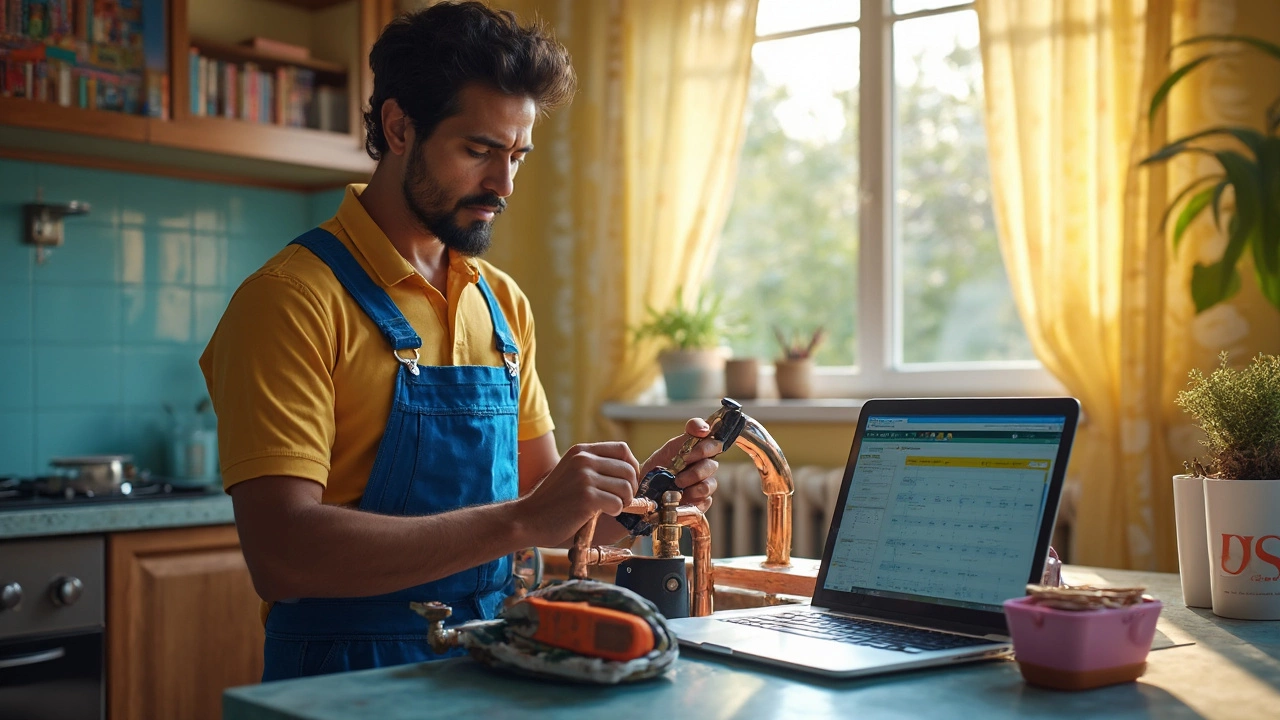Is Plumbing a High Income Skill? Breaking Down the Truth Behind Plumbing Careers in 2025
 Jun, 24 2025
Jun, 24 2025
Picture this: You're at your mate's place, and a pipe bursts under the sink. Water's gushing out, panic sets in, and everyone scrambles for towels. But when you ring up the plumber, they show up calm, handle the chaos, and leave behind a neatly fixed pipe—and a bill that makes your jaw drop. It sounds like something from a sitcom, but honestly, this happens more often than people think. Believe it or not, those bills paint a pretty clear picture: plumbing can be a serious earner if you know your stuff. The real question is whether plumbing truly counts as a high income skill, or if it's just another manual job with a bit of spotlight. Let's pull the curtain back and get real about what plumbers actually earn, the work they do, and why so many folks in 2025 are suddenly sizing up pliers and wrenches as the tools of a solid future.
The Real Numbers: How Much Do Plumbers Earn in 2025?
Money talks, so let’s have an honest chat about plumber pay in the UK right now. Back in the day, people thought of plumbers as blue-collar workers scraping by with the rest of the trades. Fast forward to 2025, and the numbers look very different. The latest national data says the average UK plumber's salary is around £37,000 a year, but that's just the starting line. If you’ve got experience under your belt or run your own business, you're probably smiling all the way to the bank. Self-employed plumbers regularly pull in £50,000 a year, and it’s not unheard of for some to pass the £80,000 mark—especially in bigger cities like Birmingham or London, where emergency callouts bump up the bill.
To give you a real-world perspective, check out this simple breakdown of average plumber earnings compared to other popular skilled trades as of June 2025:
| Trade | Average Annual Salary (UK) | Top Earners (Self-Employed) |
|---|---|---|
| Plumber | £37,000 | £80,000+ |
| Electrician | £36,000 | £70,000+ |
| Carpenter | £31,000 | £56,000+ |
| Bricklayer | £29,500 | £49,000+ |
But here’s the kicker: plumbing doesn’t just pay well because of the hourly rate. Plumbers rake in extra money for weekend callouts, after-hours emergencies (those dreaded 2am floods), and specialist jobs. A standard callout can set someone back £90, while more complex repairs or installations can tip over £500. There’s also a constant demand—pipes never pick a good time to burst, right? The predictably unpredictable nature of plumbing problems means steady income for those with grit and good skills.
And while London leads the pack for high plumbing costs, places like Birmingham aren't far behind. I know several lads who started as apprentices in 2018, and now, seven years later, they have their own vans, logos, and even a few guys working for them. In some cases, they’re earning double what they thought possible. So if you’re asking if plumbing is a high income skill in today’s market, you only have to look at the money rolling in for anyone who knows what they're doing. The demand's still hot, the bills keep rising, and the trade isn’t going out of style any time soon.
Why Plumbing Pays: The Skills Shortage and Steady Work
People like to joke that the only certainties in life are death, taxes, and unexpected plumbing disasters. As funny as that is, it lines up perfectly with why plumbing pays so well right now—the work simply never runs out. Part of this high demand boils down to a real crisis: the UK’s got a massive skills shortage in trades like plumbing. Youngsters aren't rushing into the trade as much as you'd think, which has left the average age of plumbers creeping towards 50. With lots of old hands heading for retirement, there's now a gap that needs filling.
Here’s an interesting stat: in a 2024 survey by the Federation of Master Builders, almost 56% of small UK construction firms said they struggled to find qualified plumbers. That kind of shortage puts skilled workers in the driver's seat, letting them charge premium rates and pick their own hours. If you like the idea of being your own boss, plumbing opens that door faster than most careers do.
The flexibility is another draw. Some plumbers prefer full-time work with big companies—water utilities, housing developers, or maintenance firms. Others go solo, handling home emergencies or specialising in fancy bathroom installs and eco-friendly tech, like heat pumps or greywater recycling. The point is, there’s a path for everyone. As homes get older and new building regs push for greener, smarter plumbing, the variety of work keeps expanding. I've seen friends turn niche skills—say, high-end boiler fitting—into a lucrative side gig that rivals their main salary.
But maybe the best reason why plumbing stands out as a high income skill is its shield against economic downturns. When things get tight, people skip restaurant dinners or put off new cars, but no one ignores a leaking geyser or a bust pipe. Emergency jobs keep landing on the calendar. Even during the Covid lockdowns, plumbers were classed as key workers, given special permission to work in homes when others weren't allowed. Try finding that kind of job security in many other professions these days!
It’s not all easy money, though. Plumbing has its fair share of mess, stress, and heavy lifting. But for those who don’t mind the odd wrench slip or knuckle scrape, the rewards go far beyond a decent wage.

How to Get Started in Plumbing and Succeed
If you've ever watched a seasoned plumber work, you'll notice it’s not just about brute strength or knowing your way around a toolbox. Getting started takes a mix of training, patience, and a willingness to learn something new nearly every week. In England, most people begin with a Level 2 or 3 NVQ Diploma in Plumbing and Domestic Heating. This usually means splitting your time between college and real-world site training through an apprenticeship—a path that lasts about two to four years, depending on how much effort you put in and which courses you pick up along the way.
One thing people always ask: Do I need to be a maths whiz? Not really. It helps if you’re comfortable with basic measurements and reading technical diagrams, but you don’t need A-levels or a university degree. What you do need is a bit of grit, a steady hand, and a talent for solving problems fast when your client's kitchen turns into a wading pool.
Once you’re qualified, the doors swing wide open:
- Self-Employment: Many plumbers go solo after a few years on the tools, setting their own rates and diary.
- Specialist Roles: With further study, you can specialise in areas like gas safety, renewable energy systems, or commercial plumbing.
- Business Opportunities: Plumbing is one of the few trades where scaling up—hiring staff, getting extra vans—can seriously boost your earnings.
If you want to stand out, customer service is your secret weapon. People talk, and a reputation for tidy, reliable work spreads fast. Happy customers lead to repeat business and those coveted word-of-mouth referrals. Plumbers with excellent people skills are always in demand, especially on social media where positive reviews win more jobs than any yellow pages ad ever did.
A few practical tips for up-and-comers:
- Don’t skimp on your toolkit—reliable tools save money (and sanity) in the long run.
- Keep your qualifications up to date, especially around gas and health safety laws. This keeps your insurance valid and your clients reassured.
- Offer emergency services if you can. Sure, it means late nights, but it’s a powerful way to bump up your annual income.
- Learn to quote jobs fairly but with profit in mind. Many new plumbers undercharge at first because they want the work. Value your time and skills.
You don’t need flashy advertising. Bing. Instagram, Facebook business pages, and local WhatsApp groups can get your name out there faster than pouring money into traditional marketing. The key: show your work, share customer reviews, and be responsive. That’s what gets the phone ringing, and often makes the difference between occasional gigs and a booked-up calendar months ahead.
Is Plumbing Right for You? Challenges and Reality Check
No sugar-coating here—plumbing can be tough, unpredictable work. You’ll deal with everything from freezing cold mornings in January when someone’s heating is out, to waist-deep water after a major leak in the middle of June. Sometimes the jobs are physically demanding: crouching under kitchen sinks, dragging radiators up narrow stairs, or working in cramped boiler cupboards. A sense of humour really helps when disaster strikes or your trousers get drenched for the third time in a week.
People often ask if it’s worth the tough start and long hours, considering the high income potential. Truth is, plumbing suits those who enjoy a bit of variety, like hands-on problem solving, and can stay calm under pressure. If you dread unpredictable work, last-minute schedule changes, or the idea of getting your hands dirty, you might want to think twice. But for those willing to work hard, plumbing offers something unique: a skill set nobody can take away, with pure earning potential limited only by your hustle and reputation.
There’s another side of the coin: public perception. In 2025, attitudes towards skilled trades are starting to shift. More parents and schools are encouraging hands-on careers, and the stigma around manual work isn’t what it was a generation ago. Plumbing isn’t seen as a “back-up plan” or a last resort for people who can’t hack university life. Instead, savvy folks are looking at plumbers as smart, resourceful professionals with financial security most office workers only dream of. When you see a plumber’s van outside a big house in Harborne or Solihull, it’s a sign they’ve made it—not just scraping by, but thriving in a skill-hungry economy.
And don’t forget the ripple effect: skilled plumbers build a network of contacts—builders, estate agents, landlords—which opens doors to more work and side hustles. I’ve met plumbers who’ve moved into property renovation, started plumbing supply shops, or gone into teaching the next generation of tradespeople. It’s the kind of flexibility few careers offer, and it’s only getting stronger with the growing demand in the sector.